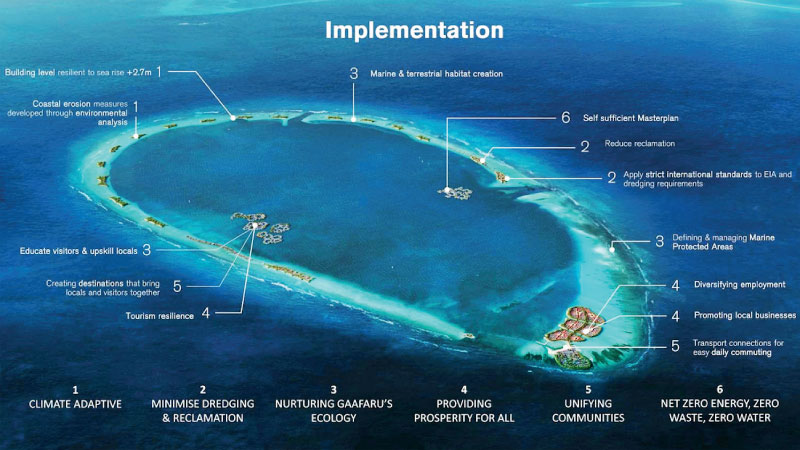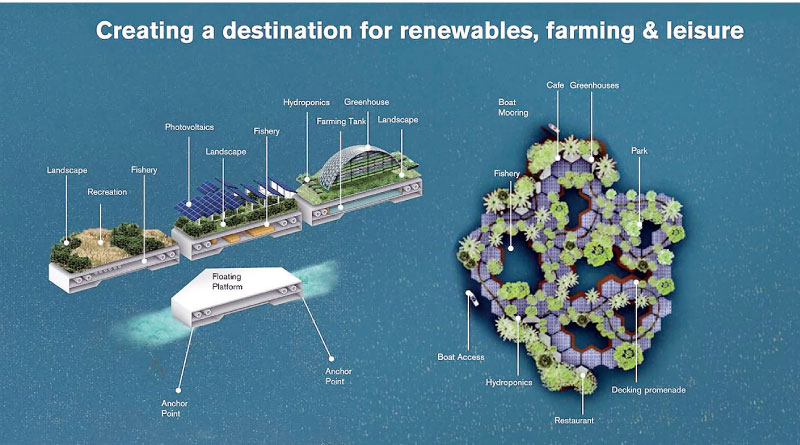Thursday Feb 26, 2026
Thursday Feb 26, 2026
Monday, 2 December 2024 00:26 - - {{hitsCtrl.values.hits}}

Creating a destination for renewables, farming and leisure – image source: arquitecturaviva

Masterplan implementation – image source: arquitecturaviva
 |
| Chairman and Managing Director Thilan Wijesinghe |
 |
| Senior Vice President Natasha Silva
|
The Advisory arm of TWC Holdings (formerly TWCorp), a company founded in 2012 by Thilan Wijesinghe, has emerged as a transformative partner in adapting tourism development to meet the impacts of climate change in the Maldives. Recently, the Maldives Fund Management Corporation (MFMC) was advised by Thilan, who is a specialist in Public Private Partnerships, to craft a comprehensive Request for Proposals (RFP) to identify an international firm of architects and master planners to design a “Climate Adaptive Vision Masterplan” for Gaafaru, an inhabited island of Kaafu Atoll.
Upon evaluation of the proposals received, Foster + Partners, the world-renowned architectural firm in London founded by Norman Foster, was selected by MFMC. Through a comprehensive study of Gaafaru, Fosters’ sustainability team and in-house ecologists have proposed a master plan built on six key principles to ensure highly sustainable, climate-adaptive and inclusive development anchored on tourism.
Speaking on the initiative, TWC Holdings Chairman and Managing Director Thilan Wijesinghe, stated: “The Gaafaru project is a transformative step for the Maldives, showcasing how climate-adaptive planning can ensure sustainable growth in tourism while protecting fragile ecosystems. This initiative serves as a model for other small island nations, demonstrating the power of forward-thinking strategies to drive resilience and economic opportunity in the face of climate change.”
The master plan is based on environmental analysis and understanding rising sea levels over the next century. The land will be sustainably reclaimed – using low-impact building techniques – and built at a higher level to decrease the risk of sea-level rise over one hundred years. Reclaimed land area will be reduced by 45% (from business-as-usual building methods in the Maldives), and 70% of reclaimed land will be given over to marine and terrestrial habitats for native planting. Establishing Marine Protected Areas and a Marine Institute will aid in protecting and educating locals and visitors alike. The master plan for this integrated tourism project – which consists of private islands, two ultra-luxury resorts, tourist guesthouses in the inhabited island – aims to diversify economic opportunities in the Maldives.
Commenting on the initiative, TWC Holdings Senior Vice President Natasha Silva stated: “By connecting Fosters with SIGS we aim to bring in global best practices and knowledge to influence local island councils and guesthouse owners in the Maldives to adopt climate-adaptive building codes for private guesthouse investments. This initiative has the potential to set a new standard for sustainable tourism development, aligning local practices with global resilience strategies.”
To integrate locals and tourists, the master plan will provide a mobility network that connects local areas with the new resorts. In addition, the master plan will significantly reduce Gaafaru Island’s reliance on imports. All fruit and vegetables will be produced through local farming, hydroponics and greenhouses on new floating platforms and reclaimed land, which will also provide energy through photovoltaics, resulting in a 60% expected reduction in fuel consumption for energy.
TWC also serves as a subcontractor for USAID’s five-year climate adaptation program in the Maldives and Sri Lanka. As a part of this work, TWC facilitated a partnership between Fosters + Partners and the Maldivian NGO, Small Island Geography Society (SIGS) – a USAID grant recipient, to support university and architecture students in adopting climate-adaptive design principles for tourism guest houses in inhabited islands. This collaboration brings world-class expertise to small island nations, promoting sustainable tourism through energy-efficient designs using locally sourced materials. This initiative is set to bolster Maldives’ reputation as a sustainable tourism destination while equipping communities to tackle climate impacts on tourism revenue and employment.